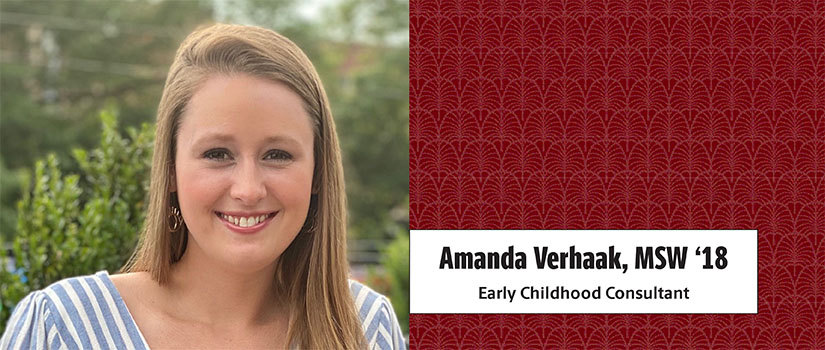Amanda Verhaak, MSW ’18, often babysat her sister as well as friends and their siblings. She also worked at youth camps and interned with children in residential programs. Verhaak has always been comfortable around children and knew she wanted to work in a child-related job. Even though COVID-19 has prevented her from entering classrooms, and she is more than 1,700 miles away from her job site, she is still helping teachers positively influence students.
Verhaak moved from Boston to Dallas last year, but the pandemic has still allowed her to work virtually as an early childhood consultant for the Massachusetts-based Justice Resource Institute. The institute is a human services organization providing a variety of services for children and families. Verhaak’s role is to minimize the statewide rates of suspensions and expulsions of children (five and under) in preschool programs. She primarily works with preschool to elementary-age children and their families.
“Prior to COVID, we were referred to a child with a challenging behavior, such as hitting, kicking, spitting or screaming. We went into the classroom and observed how the teachers interacted with the child, how they reacted, and what might trigger their behavior,” Verhaak says. “We wrote a report and worked with the teachers on classroom strategies and how to better increase their classroom management and behavior skills to help the children.”
But the pandemic has made Verhaak’s job more challenging because all observations are performed on Zoom. This sometimes prevents her from seeing everything in the classroom that may provide clues for a child’s behavior.
“The teacher uses a laptop or their phone and follows the child we’re observing,” Verhaak says. “You can't always see or hear everything. For example, a child may be triggered because someone else hit them, but now I might not see that because they are off in a corner.
I miss the personal interactions. We used to talk with teachers but it’s hard to do that on Zoom or a phone call. I feel like we are not getting as much information as we were in the past.”
Verhaak knew she was interested in helping others while majoring in psychology at the University of Arkansas. But she was not interested in a research-based job. Instead, an introduction to social work class her junior year helped her discover a future career path.
“Once I started looking at MSW programs and classes, I realized social work had everything I wanted to do,” Verhaak says. “South Carolina appealed to me because I was really looking forward to all of the classes, and the children, youth and families specialization was helpful because I knew that was the population I wanted to work with.”
Verhaak’s field placement was at the Bryan Psychiatric Hospital in Columbia during her advanced year. According to Verhaak, it was a perfect fit because it combined her interests in psychology, social work and children. But one impactful experience still influences her today.
“I interacted with a 13-year-old girl who had been through a tragic and traumatizing experience. She was working with her family at their fruit stand along the side of the road when her mom died after a car crashed into the stand,” Verhaak says. “While she had already endured previous mental challenges, this event set her off and made it hard to work with her at times. She would look at me and scream because she thought I was someone from her past. But despite that, I was able to work with her. It was very difficult but a rewarding and powerful experience. I’ll never forget her.”
Verhaak’s classes at the College of Social Work, her experiences at the psychiatric hospital and her first job at South Bay Community Services in Massachusetts helped set the foundation for her career.
“My first job was an early interventionalist, where I went into homes and worked with children from birth to three. I typically worked with adolescents, so it was an adjustment working with younger children,” Verhaak says. “But I primarily worked with the children’s parents. All of my social work classes, especially cognitive behavioral therapy, taught me how to better talk with people and learn interviewing tips to talk with parents in a different way and ask leading questions instead of "yes" or "no" questions that ended the conversation.”
Verhaak plans to remain in Texas and has already received her social work license so she can begin working in the state once full-time in-person classes resume and she is unable to work virtually. She wants to continue to work with children since it gives her an enormous amount of fulfillment.
“In my current job, it’s fulfilling when you see your suggestions work and the child’s behavior improves. The teachers and parents are happy and don't need our help,” Verhaak says. “The goal is for us to not be there, so when we don't get a call for a long time, we know that our suggestions and recommendations are working.”
